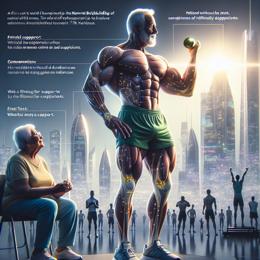Image created by AI
Study Finds Exercise Yields More Health Benefits for Women than Men
The impact of physical activity on health has long been known, but a recent research breakthrough is shedding light on gender disparities in the benefits of exercise. A study published in the Journal of the American College of Cardiology highlights a compelling finding—women appear to reap more significant health benefits from exercise than their male counterparts. While the general adage "exercise is good for you" holds, this study suggests the value of a tailored approach in encouraging physical activity, bearing in mind gender-based physiological responses.
Dr. Susan Cheng and her team at the Institute for Research on Healthy Aging at Cedars-Sinai have presented analysis from over 400,000 U.S. adults that underscores a noteworthy trend. According to Cheng, women require less exercise than men to achieve the same health outcomes, such as a reduced risk of mortality and cardiovascular events. For instance, a 24% decreased risk of death from any cause was associated with women who exercised for at least 150 minutes a week, whereas men had a 15% reduction.
Furthermore, women benefited from a marked 36% reduced likelihood of suffering a heart attack or stroke with regular exercise, compared to a 14% lesser risk in men who engaged in similar physical activity. Remarkably, the optimum health benefits for men seemed to plateau at 300 minutes of weekly exercise, but women continued to see improvements up to this threshold.
An important caveat, however, is that this study was observational and can only draw correlations rather than causations between exercise and health outcomes. Nevertheless, it provides strong evidential support for the protective qualities of regular aerobic and muscle-strengthening exercises.
The research propels a vital public health message. Despite the convincing benefits of exercise, most adults fail to meet the recommended amounts of physical activity proposed by the Physical Activity Guidelines for Americans. This finding acts as a renewed call for individuals to prioritize their physical well-being amidst sedentary modern lifestyles.
The disparities in the benefits of exercise among genders may stem from several factors. From sociocultural to physiological differences, Cheng suggests that historical norms have led to less encouragement for females to engage in physical activity compared to males, which could mean that when women do exercise, they are starting from a different baseline and thus see greater improvements.
Dr. Andrew Freeman of National Jewish Health emphasizes the importance of this study's findings and the need to consider these differences in medical advice and treatment—approaching health with a more personalized lens that accounts for factors like sex and ethnicity.
As societies strive towards improved well-being and disease prevention, this research adds a significant layer to our understanding of exercise's role in healthcare. Personalized fitness prescriptions based on gender could very well become a staple in the future of preventive medicine, resulting in more effective health interventions and outcomes.
Regular physical activity, evidently, is not just beneficial; it's crucial. And for women in particular, the 'sweat equity' might yield a higher return on investment when it comes to their health. The challenge remains, however, in encouraging and facilitating a more active lifestyle for all, removing barriers to access and participation in regular exercise.
In conclusion, the data from Cedar-Sinai's latest study has potent implications. It highlights that exercise may indeed be one of the best preventive medicines available—non-prescriptive, universal, and significantly impactful. Further research may be necessary to decode the exact mechanisms behind these gender differences, but for the public, the message is clear: for a healthier life, keep moving.










